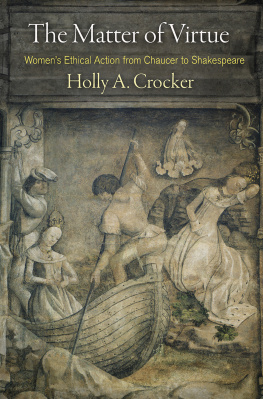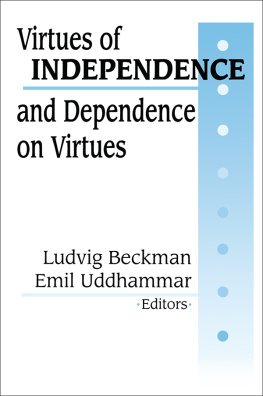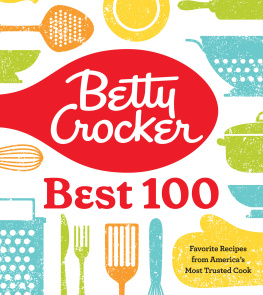
The Matter of Virtue
The Matter of Virtue
Womens Ethical Action
from Chaucer to Shakespeare
Holly A. Crocker
UNIVERSITY OF PENNSYLVANIA PRESS
PHILADELPHIA
Copyright 2019 University of Pennsylvania Press
All rights reserved. Except for brief quotations used for purposes of review or scholarly citation, none of this book may be reproduced in any form by any means without written permission from the publisher.
Published by
University of Pennsylvania Press
Philadelphia, Pennsylvania 19104-4112
www.upenn.edu/pennpress
Printed in the United States of America on acid-free paper
1 3 5 7 9 10 8 6 4 2
Library of Congress Cataloging-in-Publication Data
Names: Crocker, Holly A. (Holly Adryan), 1971 author.
Title: The matter of virtue : womens ethical action from Chaucer to Shakespeare / Holly A. Crocker.
Description: 1st edition. | Philadelphia : University of Pennsylvania Press, [2019] | Includes bibliographical references and index.
Identifiers: LCCN 2018056720 | ISBN 9780812251418 (hardcover)
Subjects: LCSH: English poetryMiddle English, 11001500History and criticism. | English poetryEarly modern, 15001700History and criticism. | Virtue in literature. | Women in literature. | Ethics in literature.
Classification: LCC PR311 .C76 2019 | DDC 821/.2099287dc23
LC record available at https://lccn.loc.gov/2018056720
For Tommy and Ambrose
CONTENTS
PART II. GRACE, ENACTED:
ROMANCE AND MATERIAL VIRTUE
INTRODUCTION
Virtues That Matter
For use almost can change the stamp of nature.
Shakespeare, Hamlet, III.iv.151.8
Whan that Aprill with his shoures soote
The droghte of March hath perced to the roote,
And bathed every veyne in swich licour
Of which vertu engendred is the flour
Chaucer, General Prologue, I.14
This book investigates premodern vertue, or the embodied excellence that enables womens ethical action in vernacular English poetry between 1343 and 1623. Yet, when he concludes his counsel with the remark, For use almost can change the stamp of nature (my emphasis), he suggests that Gertrude cannot fully enact this or any other virtue (III.iv.151.8). Instead, he imagines Gertrudes virtue as a decorative covering, as a frock or livery / That aptly is put on (III.iv.151.45). Hamlet renders Gertrudes virtue as superficial, and, by so doing, he forecloses her potential for ethical action. This devaluation of virtues that matteras well as the association of these embodied powers with womenfocuses the ensuing argument.
Material Virtue
Like Hamlet, we often refer to virtues as qualities that humans might perform, and for good reason. As this study shall acknowledge, virtues are fundamentally engaged with what it means to be human. Yet, during the period studied in this book, virtues are also the defining properties of material things. In medieval and early modern England, a rich vernacular vocabulary reveals that premodern virtues are physical qualities. Like better-known areas of virtue ethics, this tradition can also be traced to Aristotle, who claims in The Physics, the virtues are perfections of nature.
Vertues were not simple or inert characteristics of a physical body. Jeffrey Jerome Cohen theorizes vertu as life force: reproduction and vitality, affect and intellect and health, that which moves the flesh. We might best understand each of these virtues as an affordance, or the capacity for a specific body to flourish in a particular environment. In the most fundamental sense, vertues improved the bodies they inhabited.
This sense of virtues materiality continued in the early modern period. Herbals as well as medicinal tracts attend to the vertues of different plants and potions. The brief broadsheet, The admirable vertue, property and operation of the quintessence of rosemary flowers and the meanes to vse it for the sickesses and diseases herein mentioned (1615), equates vertue to a physical potency: Moreouer, the force and vertue thereof extendeth it selfe euen to the sinewes shrunke and weakned. Virtues are not intangible, theoretical principles; rather, bodies have the potentialities their virtues enable.
Treating virtue as the animating power of a physical body was not confined to the specialized vocabularies of science, husbandry, or medicine. Rather, as I shall argue in greater detail, it is also important to literary representations, which seek to bring bodies to lifeon the page, on the stage, or both. The well-known opening of Chaucers Canterbury Tales, from which I take my second epigraph, affirms the animating power of material virtues: Of which vertu engendred is the flour (I.4). As it does in other instances, virtue enlivens a physical body. Those animate bodies, in turn, have the power to affect those around them. Elsewhere in Hamlet, when Laertes observes Ophelias madness, he curses his eyes natural powers:
Tears seven times salt
Burn out the sense and virtue of mine eye! (IV.v.154)
Ophelias madness affects Laertes in an intimate, immediate fashion. The suffering chronicled on the stage, in turn, is designed to move audiences in a tangible, demonstrable fashion. This influence is moral, insofar as it prompts Laertesand insofar as it might provoke the plays spectatorsto live in a different way. The ability for bodies to make a moral difference to one another is both ethical and physical, for this kind of virtue materializes a world organized by specific values.
Material virtues power is centrally connected to representational art, and its ethical standing. Indeed, although a physical bodys power to affect those around it is well known, this capacity has long founded critiques of the theater, as well as the literary arts more generally. Augustine, notably, dismisses the theaters ability to evoke pity as a sham form of ethics, since, as he queries, But how can the unreal sufferings of the stage possibly move pity.
Despite his disapproval, Augustine confirms that poetic stories bring bodies to life, and shows how those bodies exert moral power over their immediate audiences. Yet, since the ethical demands such bodies issue are not concerned with Christian salvation, Augustine insists this power is wholly negative. The poets and playwrights I study in this book would also meet with Augustines censure, for they are primarily concerned with imagining how people might lead better lives in the everyday circumstances of premodern England. Even narratives that prioritize Christian salvation are firmly grounded in a material world that is riven with contingency and violence, but has the potential for improvement and reform. This quotidian materialism is due, I suggest, to the sense that human excellence must be set in relation to physical powers that worked, for good or ill, as part of a broader ethical ecology in the premodern world. In a darker affirmation of these physical powers, when Laertes conspires to poison Hamlet he tells Claudius the potion is beyond the powers of any medicine:
And for that purpose Ill anoint my sword.
I bought an unction of a mountebank
So mortal that, but dip a knife in it,
Where it draws blood no cataplasm so rare,
Collected from all simples that have virtue
Next page















